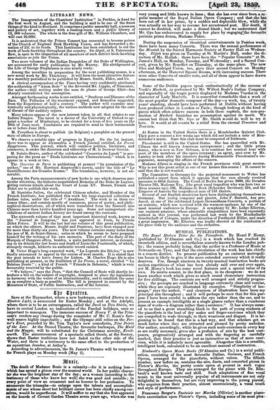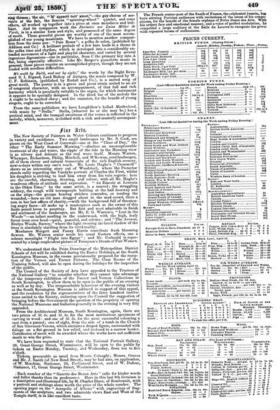MUSICAL PUBLICATIONS.
The Royal Modern Tutor for the Pianoforte. By Henri F. Remy, (published by D'Almaine and Co.) is a work which has reached its twentieth edition, and is nevertheless scarcely known to the London pub- lic ; the reason probably being, that the author is a Professor of Music at Newcastle-on -Tyne, and that the circulation of the work has lain chiefly in a remote district. Its present publication by an eminent metropoli- tan house is likely to give it the more extended currency which it really deserves. For, though nineteen in twenty musical instruction books are useless repetitions of what has been already said over and over again, yet M. Hemy's book has some novel features and a special value of its own. Its merits consist, in the first place, in its cheapness : we do not know another work which gives so much sound elementary instruction for five shillings. The contents are well arranged and strictly progres- sive ; the precepts are couched in language extremely dear and concise, while they are copiously illustrated by examples. " Simplicity of lan- guage," says the author, " and clearness of illustration have been my principal aim throughout ; and it will perhaps be seen that for this pur- pose I have been careful to address the eye rather than the ear, and to present an example intelligible at a single glance rather than a cumbrous mass of words—a diagram rather than a sentence." It has always seem- ed to us that a great stumbling block in the path of young students of the pianoforte is the load of dry scales and finger-exercises which they are compelled to wade through, to their weariness and disgust. It is be- ginning to be found that this is a bad way, and that scholars get on much better when they are attracted and pleased by pretty melodies. Our author, accordingly, while he gives such scale-exercises in every key as are really necessary, gives also a profusion of airs by the best com- posers, progressively arranged and with the fingering so carefully marked, that their practice is just as instructive as that of mere exer- cises, while it is infinitely more agreeable. Altogether this is a sensible, intelligent book, calculated to be an excellent manual of instruction.
Rimbaule s Opera Music Books (D'Almaine and Co.) is a serial publi- cation, consisting of the most favourite Italian, German, and French Operas, arranged for the pianoforte, without voices. The fiftieth number, now before us, contains the airs, duets, and concerted pieces in Flotow's Martha, the pretty comic opera at present in such vogue throughout Europe. They are arranged for the piano with Dr. Bun- bault's well known taste and skill. Such adaptations of fine vocal music to the most universally popular of all instruments are not only delightful in themselves, but are very improving to the young pianist, who acquires from their practice, almost unconsciously, a vocal touch and style of performance.
Francesco Berger's Fantaisie sur Martha (011ivier) is another piano- forte exercitation upon Flotow's Opera, including some of its most plea-
sing themes ; the air, " M' apparri tutt' amor,"-the gay chorus of ser- vants at the fair, the famuus " spinning-wheel " quartet, and some others, all worked up together into a piece at once melodious and bril- liant. And its companion work the Fantaisie sur Luisa Miller de Verdi, is in a similar form and style, and possessed of the same degree of merit. These graceful pieces are worthy of one of the most accom- plished of our young musicians. We have to mention another composi- tion from the same pen : "Pale Roses"; a polka de salon, (published by Addison and Co.) A brilliant prelude of a few bars leads to a theme in the polka time and rhythm, which is developed into a considerably ex- tended movement of a light and playful character, and varied by several ingenious digressions-one in particular, from C the primary key into A flat, being especially effective. Like Mr. Berger's pianoforte music in general, these pieces require an accomplished player, though they are not loaded with needless difficulties.
We walk by Faith, and not by sight," the words by the Right Reve- rend S. I. Rigaud, Lord Bishop of Antigua, the music composed by W. C. F. Robinson, (published by Rudall and Co.), is a sacred song of great merit. The poetry is in a grave and pious strain united to an air of congenial character, with an accompaniment, of that full and rich harmony which is peculiarly suitable to the organ, for which instrument it appears to be specially designed. In the third bar of the melody the A ought to be marked sharp; and the omission, for the benefit of young singers, ought to be corrected.
From the same publishers we have Longfellow's ballad Maidenhood, with music by "Stella." Stella, (whoever he or she may be,) has a poetical mind, and the tranquil sweetness of the verses is reflected in the melody, which, moreover, is clothed with a rich and masterly accompani- ment.



























 Previous page
Previous page